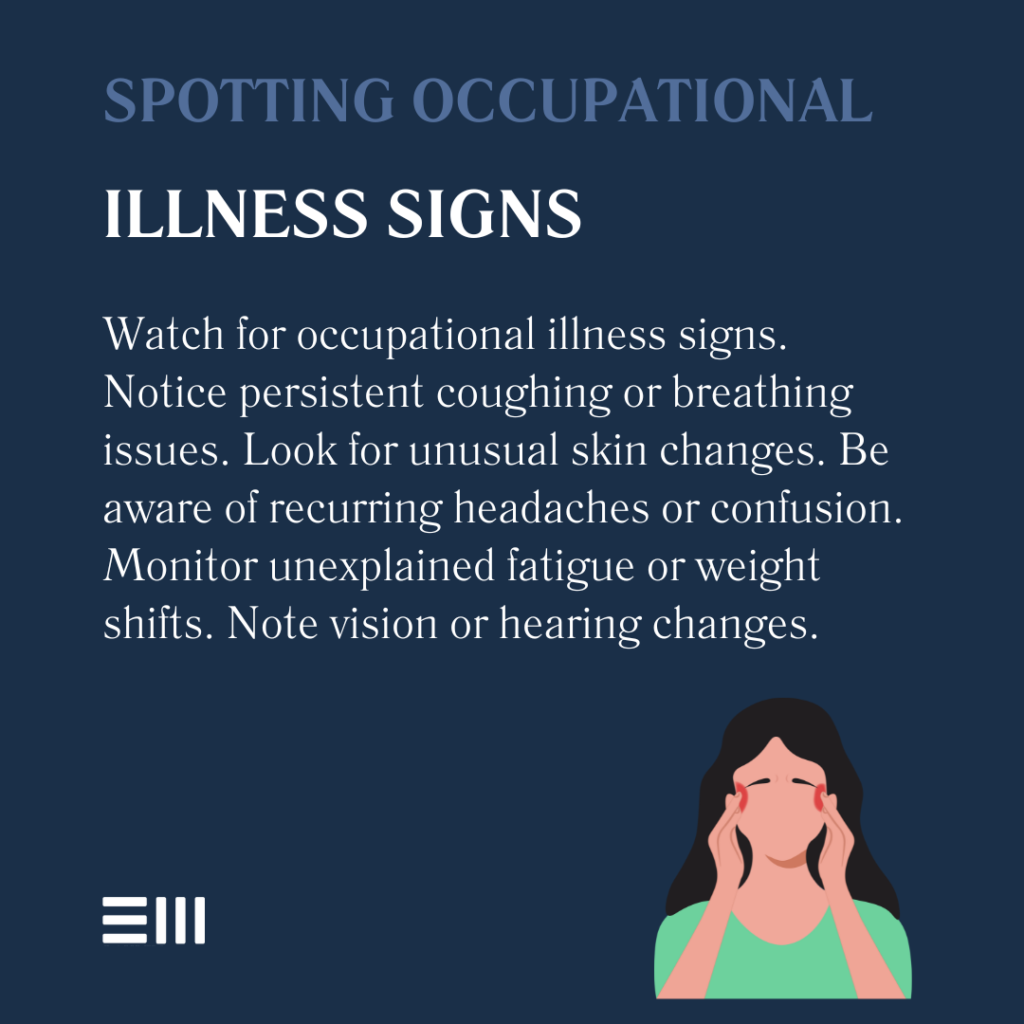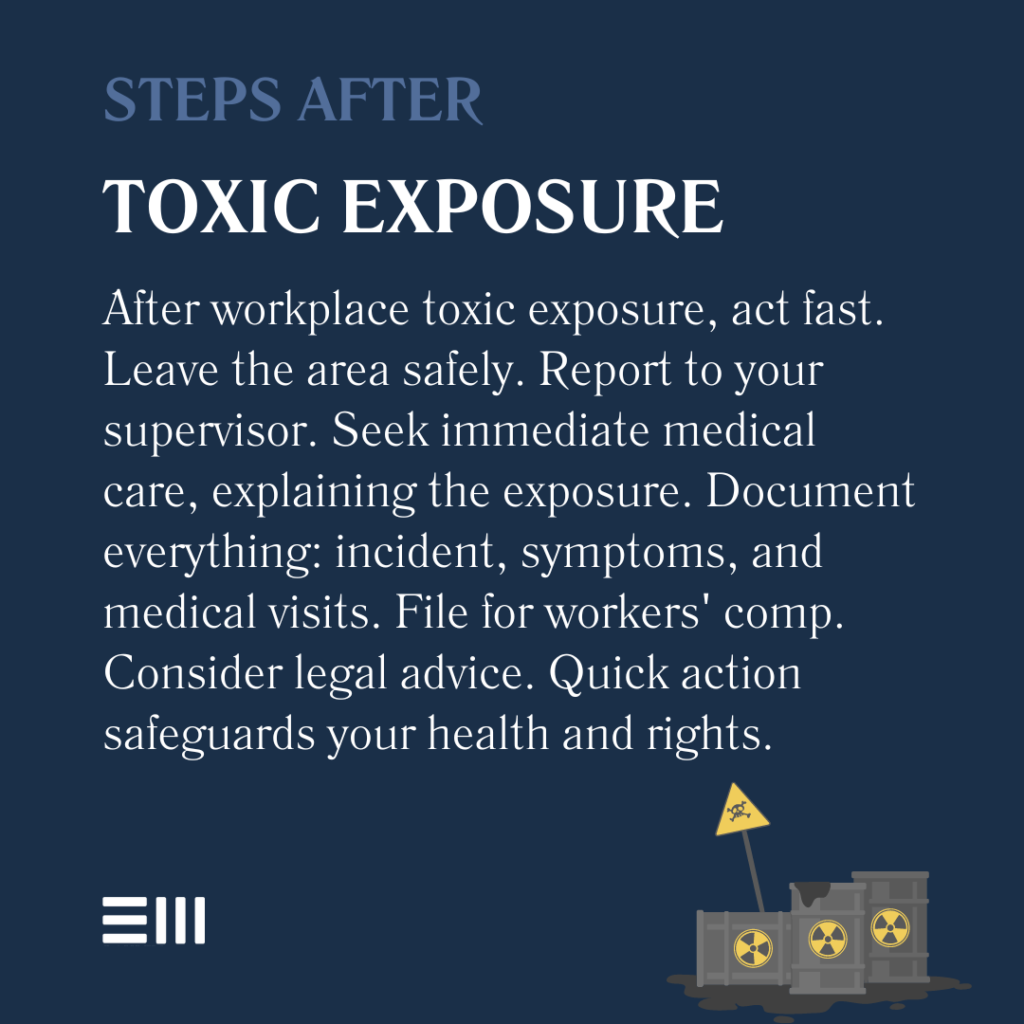
Did you know that every year, over 190,000 workers in the United States develop illnesses due to harmful workplace exposures? This staggering statistic underscores the critical importance of understanding occupational illnesses and toxic exposure in the workplace.
As an employee in Alabama, being informed about these risks not only protects your health but also empowers you to take action if you’ve been affected.
Here, our Alabama workplace accident attorneys will walk you through the essential aspects of workplace toxic exposure, from recognizing symptoms to understanding your legal rights and the steps you can take to ensure your safety and well-being.
Understanding Occupational Illnesses and Toxic Exposure
Occupational illnesses and toxic exposure refer to health conditions that develop due to harmful substances or environments in the workplace.
These can range from acute reactions to long-term chronic diseases, often resulting from prolonged exposure to hazardous materials, chemicals, or physical agents.
The impact of occupational illnesses extends far beyond the individual worker, affecting families, businesses, and communities. Understanding the nature of these illnesses is crucial for prevention, early detection, and appropriate treatment.
Common Types of Workplace Toxic Exposures
Workplace toxic exposures can occur in various industries and settings. Some of the most common types include:
- Chemical exposures (e.g., solvents, pesticides, heavy metals);
- Asbestos exposure;
- Silica dust;
- Biological hazards (e.g., mold, bacteria, viruses);
- Radiation exposure;
- Noise pollution; and
- Air pollution and poor indoor air quality.
Each type of exposure carries its own set of risks and potential health consequences. Being aware of these common hazards can help workers identify potential dangers in their work environment and take necessary precautions.
Recognizing Symptoms of Occupational Illnesses
Identifying symptoms of occupational illnesses is crucial for early intervention and treatment.
Common symptoms may include:
- Respiratory issues (e.g., coughing, wheezing, shortness of breath);
- Skin problems (e.g., rashes, irritation, discoloration);
- Neurological symptoms (e.g., headaches, dizziness, confusion);
- Gastrointestinal disturbances;
- Fatigue and general malaise;
- Unexplained weight loss or gain; and
- Vision or hearing problems.
It’s important to note that symptoms can vary widely depending on the type of exposure and individual factors. If you experience persistent or concerning symptoms, consult a healthcare professional promptly.

Legal Rights and Protections for Workers
As an Alabama worker, you have specific legal rights and protections regarding workplace safety and health.
These include:
- The right to a safe and healthy work environment;
- The right to receive information and training about workplace hazards;
- The right to report unsafe conditions without fear of retaliation;
- The right to access medical and exposure records; and
- The right to file a complaint with OSHA.
Understanding these rights empowers you to advocate for your safety and well-being in the workplace. Employers are legally obligated to provide a safe working environment and address potential hazards promptly.
Steps to Take if You Suspect Toxic Exposure at Work
If you believe you’ve been exposed to toxic substances at work, follow these steps:
- Report the exposure to your supervisor or employer immediately;
- Seek medical attention and inform the healthcare provider about the potential exposure;
- Document the incident, including date, time, location, and any witnesses;
- Keep records of all medical treatments and diagnosis;
- File a workers’ compensation claim if applicable; and
- Consider consulting with an experienced attorney specializing in workplace injuries.
Taking prompt action can help protect your health and preserve your legal rights in case you need to pursue compensation or legal action.

Prevention and Safety Measures
Preventing toxic exposure is always preferable to treating its effects.
Here are some key safety measures:
- Use proper personal protective equipment (PPE);
- Follow all safety protocols and procedures;
- Participate in safety training programs;
- Maintain good hygiene practices at work;
- Advocate for regular workplace inspections and air quality testing; and
- Stay informed about potential hazards in your industry.
Employers and employees share the responsibility of maintaining a safe work environment. Open communication about safety concerns is essential for effective prevention.
Seeking Medical Attention and Documentation
If you suspect toxic exposure, seeking prompt medical attention is crucial. When consulting a healthcare provider:
- Describe your work environment and potential exposures in detail;
- Provide a complete history of your symptoms;
- Request appropriate medical tests and screenings;
- Ask for copies of all medical records and test results; and
- Follow up with recommended treatments and additional tests.
Proper medical documentation is vital for both your health and any potential legal or compensation claims you may need to pursue.
Compensation and Benefits for Affected Workers
Workers affected by occupational illnesses or toxic exposure may be eligible for various forms of compensation and benefits, including:
- Workers’ compensation benefits;
- Disability benefits;
- Medical expense coverage;
- Vocational rehabilitation services; and
- Compensation for lost wages.
The specific benefits available can vary depending on the nature and severity of the illness, as well as state laws.
Consulting with an experienced attorney can help you understand and pursue the full range of benefits you may be entitled to.
The Role of OSHA in Workplace Safety
The Occupational Safety and Health Administration (OSHA) plays a crucial role in ensuring workplace safety. OSHA’s responsibilities include:
- Setting and enforcing safety standards;
- Conducting workplace inspections;
- Providing training and education on workplace safety;
- Investigating complaints and incidents; and
- Issuing citations and penalties for violations.
Understanding OSHA’s role can help you navigate workplace safety concerns and know where to turn for assistance if needed.
Frequently Asked Questions
Navigating the complexities of workplace toxic exposure can raise many questions.
Here, we address some of the most common concerns we receive to help you better understand your rights and options.
What Should I Do if I’m Exposed to a Toxic Substance at Work?
If exposed to a toxic substance at work, immediately remove yourself from the area if safe to do so. Report the incident to your supervisor, seek medical attention, and document all details of the exposure.
Follow your workplace’s emergency procedures and consider filing a workers’ compensation claim.
How Long Do I Have to File a Claim for Occupational Illness?
The time limit for filing a claim varies depending on the type of illness and state laws. In Alabama, you generally have two years from the date of injury or diagnosis to file a workers’ compensation claim.
However, for occupational diseases, the time may start from when you first experienced symptoms or when you reasonably should have known the illness was work-related. Consult with an attorney to understand the specific deadlines that apply to your situation.
Can I Be Fired for Reporting a Safety Concern?
No, it is illegal for employers to retaliate against workers for reporting safety concerns or filing complaints about workplace hazards.
If you believe you’ve faced retaliation, you can file a complaint with OSHA or consult with an employment attorney.
What Types of Compensation Are Available for Occupational Illnesses?
Compensation for occupational illnesses may include medical expenses, lost wages, disability benefits, and vocational rehabilitation services.
In severe cases, you may be eligible for permanent disability benefits or additional compensation through a personal injury lawsuit.
How Can I Prove My Illness Is Work-Related?
Proving an illness is work-related often requires:
- Medical documentation linking your condition to workplace exposure;
- Expert testimony from occupational health specialists;
- Evidence of hazardous conditions in your workplace;
- Documentation of similar illnesses among coworkers; and
- Records of safety violations or lack of proper protective measures.
An experienced attorney can help gather and present this evidence effectively.
Protect Your Rights and Health
Navigating the complexities of workplace accidents, occupational illnesses, and toxic exposure can be challenging. If you’ve been affected by these issues in Alabama, you don’t have to face them alone.
Our experienced team at Baxley Maniscalco is here to guide you through every step of the process, from understanding your rights to pursuing the compensation you deserve.
Don’t let uncertainty about your situation hold you back. Contact us today for a confidential consultation. Our knowledgeable attorneys will review your case, explain your options, and help you make informed decisions about your health and future.
Can't find what you're looking for? Search our site below.










